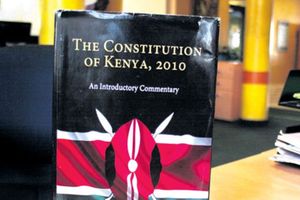
Traffic snarl-up on the Nairobi-Nakuru Highway at Rironi on December 22, 2023.
It’s the festive season and so we are looking for self-gratification. This is especially so because in Kenya it’s a tough economic season. I can’t remember when so many relatives, friends, and even strangers sought financial help from me. It’s one of those seasons where those who are fortunate shouldn’t even talk of the so-called “black tax.”
Help out if you can do so, and do it without complaining. But after the holiday season is over, we will all go back to our regular, often miserable lives. When we do, I advise that we give serious thought to the power of self-denial. Not because economic times are tough, but because self-denial is a virtue. Don’t argue with me.
Those who came of age in the 1970s like me will remember the relative innocence of our society. Little things that speak loudly about civilisation were in vogue, and seemed to come to one as a matter of course. Society was automated to common courtesies. Giving way to elders. Speaking politely. Modesty and not gratuitously displaying flesh to the world.
In the rainy season slowing down so you don’t splash pedestrians in areas with puddles of water. Saying thank you, if one did a good deed. Politicians and public servants speaking to the public – their employers – with decorum. Most importantly, I remember being taught the virtue of self-denial and the detriment of instant self-gratification. I was taught that life wasn’t just about pleasing the self.
Unpleasant
Not everything in life must be fun. I remember my children always asking me whether the activities were slated to undertake – such as mowing the lawn – would be fun. I was always truthful with them no matter how many times they asked the question.
Sometimes I would let them know that a certain chore was going to be long, draining, and unpleasant. Of course we also did many fun things that kids enjoy. We went to great Disney World several times in Orlando, Florida. We did many fun things. But the large majority of undertakings on Earth are about hard labour, whether physical or intellectual. That’s how you build character and forge upright people. Shortcuts don’t really work.
Most nations on Earth have a zeitgeist, a sort of national psyche. For example, Americans are associated with hard work. It’s not unusual for a regular Joe in the United States to hold down two or three jobs so as to provide for self and family. Of course, you can also work people to death to the detriment the nation’s psychological health. You can break a people through hard work. So you want to create a work-life balance.
But remember that usually you get out of life what you put in it assuming you live in a fair, just, and democratic society. These things about a national character are the preserve of the family, the community, the educational system, and the larger state to model.
The state in particular must inculcate in its people a work ethic and culture of courtesy. The school system stands at the center of maturing a responsible citizenry devoid of conmanship. The power of demonstration by parents, teachers, and state officials – especially at the highest reaches of the republic – is key to cultivating a good society. If officials and parents are “corner-cutters” how do they expect their progeny to do better? The maxim “do as I do, not as I say,” must be clobbered into every noggin. Don’t preach water, and then brazenly drink wine. That’s called hypocrisy.
Civilian motorists
There isn’t one rule, or morality, for parents and officials and another for everyone else. Remember the adage “monkey see, monkey do.”
Let me give you an example that’s familiar to you. It’s about the immorality on our roads. Growing up, I don’t remember drivers doing what they do today. It’s all about the total breakdown of the rule of law and the total decay of civilisation.
I believe it all started with officials who force civilian motorists off the road as they speed to nowhere. They drive on curbs and areas designated for pedestrians. It’s a total traffic jungle out there. The notorious matatus are the worst. Belching the stinkiest smoke, these vehicles, which are roadworthy, careen from side to side menacing everyone with lost limbs and death. Regrettably, the government has been impotent to put an end to the curse.
No civilised country can allow the madness we see on our roads. The late John Michuki tried to restore sanity and a modicum of order. But it all came a cropper once he was transferred from that Cabinet docket. Since then, no minister or state official, has had the guts to bring the hammer down on the killers on our roads.
It’s all about the failure to cultivate the culture of self-denial and the rise of the culture of self-gratification no matter the cost to society. That’s why corruption, thieving, and hypocrisy reign supreme unabated in Kenya.
Makau Mutua is SUNY Distinguished Professor and Margaret W. Wong Professor at Buffalo Law School, The State University of New York. @makaumutua.













